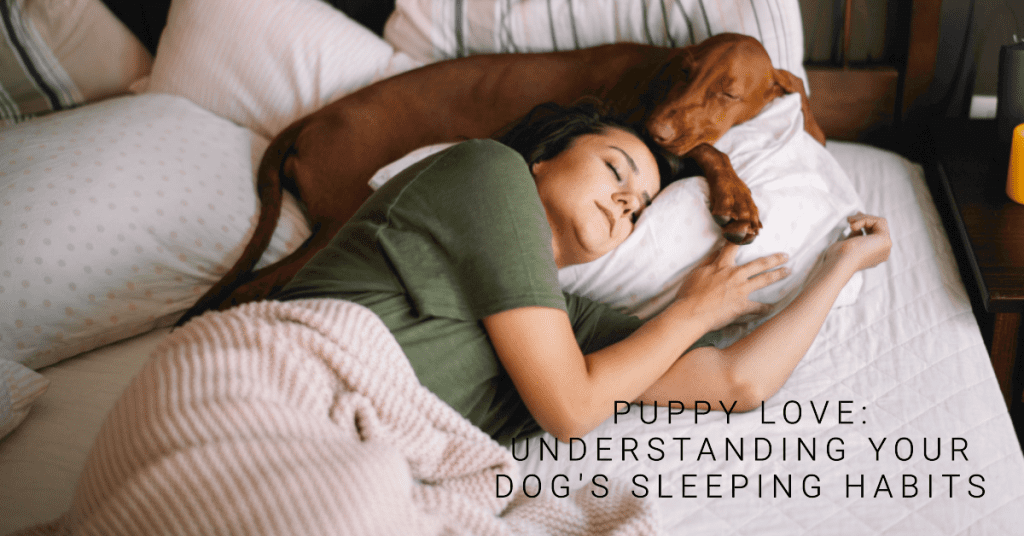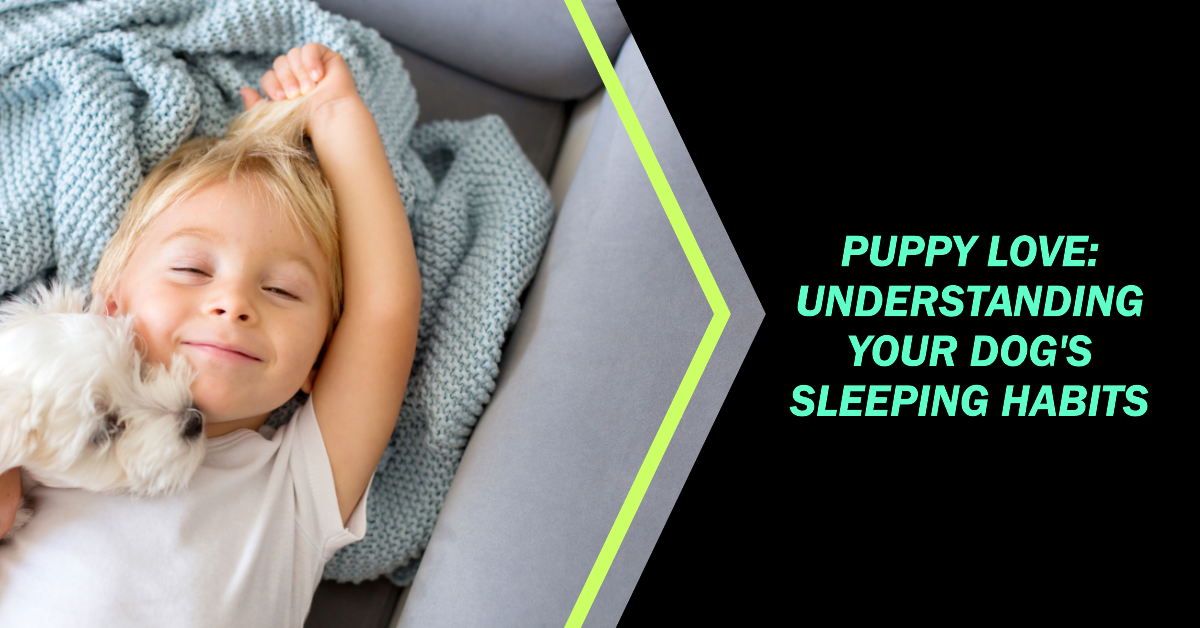Does your pup love to sleep in your room? Puzzled why they can't sleep anywhere else but near you? You're not alone! In this article, we'll look at the possible causes of Why Does My Dog Want To Sleep In My Room. Let's find out why!
Reasons Why Does My Dog Want To Sleep In My Room
Do you question why your pup loves to sleep in your room? There're several reasons.
Dogs are social and long for companionship. Being by their human family gives them a sense of comfort and safety. Also, they have a great sense of smell, so sleeping in your room lets them be surrounded by familiar scents. This helps them relax and sleep better. Last, it's important to mention that allowing your dog to sleep in your room can help build the bond between you and your dog.
If your pet wants to be close to you all night, even when they have a comfy place to rest, it may be due to separation anxiety or Fear of missing out (FOMO). In this case, it's even more essential that they sleep in your room, since it shows them they're not alone. This behavior might come from the fact that dogs think of their human family as their pack.
Tip: To make sure both you and your pup get good sleep, set up boundaries in your bedroom. Select an area for your pup to snooze without disturbing your sleep. Letting them have a bed or crate will also help create a consistent sleeping routine and promote good behavior.
By understanding why dogs like sleeping in their owner's room, we can improve our bond with our furry friends while making sure everyone gets a good night's sleep.
Emotional Connection


Dogs may sleep in their owner's rooms due to their emotional bond. This connection is formed through shared experiences, companionship, and a sense of security.
The relationship between dogs and humans is strong. Dogs are social animals that have been with us for thousands of years. They rely on us for food, shelter, and friendship.
One reason dogs may sleep in their owner's room is to help with fear of separation. Being close to their human can provide comfort and help calm them when left alone. Familiar scents and sounds can reduce anxiety and make them feel safer.
Sleeping in the same room as their owner can also be a form of protection for dogs. In the wild, they live in packs and sleep in groups for safety. Being near their owner can give them this same sense of protection.
Dogs also need companionship. They are social creatures that enjoy spending time with people. Sleeping together reinforces their bond.
Having your dog sleep in your room also has practical benefits. It's easier to take nighttime bathroom breaks with a puppy or an older dog that has bladder control issues. Your dog being nearby helps you tend to their needs without too much disruption to your own sleep.
The decision to let your dog sleep in your room depends on personal preferences and circumstances. Some people prefer to have their furry friend with them while others don't. Consider what works best for both you and your pup.
According to the American Kennel Club (AKC), 45% of dog owners allow their pets to sleep in their bedrooms. So, you're not alone in nurturing that special bond!
Do you really need an alarm clock when you have a pup sleeping in your room that wakes up at the crack of dawn?
Affection and Closeness
Dogs love to sleep in the same room as their humans! This is because they are pack animals, seeking safety and security. Plus, it strengthens their bond and gives them a sense of companionship. Dogs have great hearing and smell, so being near their owners helps them stay alert. Also, the release of oxytocin, or the “love hormone,” helps both owners and dogs relax and sleep better.
Sometimes, there may be special reasons for dogs wanting to sleep with their humans. For instance, my friend's dog, Bailey, always slept in her room. One night, he woke her up when an intruder attempted to break in. Bailey's presence allowed her to call the police and stop the intruder. Since then, Bailey won't sleep anywhere else, providing comfort and security for both of them.
Protection and Security
Protection and security are fundamental instincts in dogs. They seek comfort and safety by sleeping in their owner's room. This behavior can be traced back to their ancestral roots when dogs slept close to their pack for protection against predators.
Dogs display protective and secure behaviors, making them naturally gravitate towards sleeping in their owner's presence. This provides them with a sense of reassurance and a feeling of being guarded.
Furthermore, dogs also have an instinctive desire to protect their owners. They form strong bonds, rooted in loyalty. Dogs perceive the owner's room as a sanctuary where they can fulfill their protective role efficiently.
For instance, my friend owns a German Shepherd named Max. Every night, Max insists on sleeping in her room. One evening, when she was home alone, she heard an unfamiliar noise downstairs. Before she could react, Max had already sprung into action, barking fiercely and rushing toward the source of the noise. His unwavering dedication to guarding her showed his need for protection and security.
The behavior of dogs wanting to sleep in their owner's room stems from a deep-rooted sense of protection and security. Understanding this instinctual drive allows us to provide our furry companions with the comfort they seek while strengthening our bond with them.
Physical and Emotional Comfort
Physical and emotional comfort plays a big role in why your pup wants to sleep in your room. Let's look into this behavior.
| Physical Comfort | Emotional Comfort |
| Your body heat gives warmth, making your room nice for snuggles. | Your presence gives a sense of protection and friendship, reducing fear and loneliness. |
| The familiar smell of your room can create a comfy atmosphere for their sleep. | Being near you allows them to feel part of the family, ensuring their emotional well-being. |
| A bed or blankets in your room offer better cushioning than other parts of the house. | Your dog may also need reassurance during the night, easily accessible when sleeping close. |
Dogs instinctively need social contact and prefer being with their human friends. Some can get separation anxiety if they're left alone, so they stay close at night.
I had a friend whose pup whined if not let in the bedroom. He finally figured out his furry pal wanted the physical and emotional connection at night. Ever since, they've been happily asleep together, building their bond daily.
So, if your pup insists on sleeping with you each night, remember they need physical and emotional comfort. Enjoy this special closeness, as it strengthens the connection between you and your loyal companion. Dogs secretly think they're part of our secret dog-human society when they snooze with us!
Pack mentality and separation anxiety
Dogs have a natural instinct to be part of a pack. This includes their human family and can be intensified by separation anxiety. So, it's no surprise that they want to sleep in their owners' rooms.
The pack mentality is ingrained in their DNA. Dogs are social animals and feel safer when they're part of a group. In the wild, they rely on each other. So, when they're feeling vulnerable, like when they're sleeping, they seek comfort from their humans.
Plus, separation anxiety plays a role. When left alone or apart from their owners, dogs can become anxious. This can lead to barking, destructive behaviors, and even health problems. By sleeping in their owners' rooms, they feel reassured and less anxious.
There are things to consider when sharing a bedroom with your pup:
- Providing a sleeping space for them in your room sets boundaries while still making them feel secure.
- Also, having a consistent bedtime routine signals to them that it's time to settle down and sleep.
Pro Tip: If your dog's desire to be in your room becomes too much, talk to a vet or animal behaviorist. They can give personalized advice based on your individual situation and help address any underlying issues causing this behavior.
Natural instinct for companionship
Dogs have an innate need for companionship, which is why they want to sleep in our rooms. This comes from their ancestral past, as wolves – their pack animal relatives – sleep together for protection and bonding.
Plus, dogs can sense our emotions and moods – they know when we're feeling sad or anxious. By sleeping close to us, they offer comfort and security – relieving stress and reducing anxiety.
Sleeping in our room also helps the dog establish their territory, creating a safe haven in the home. This strengthens the bond between them and their owner, promoting trust and loyalty.
Pro Tip: To ensure a good night's rest for both human and pup, create a designated sleep space in your room. A comfortable dog bed or blanket will give them a sense of security, while still giving you enough room to move around.
Owner's presence and scent
It's not rare for dogs to want to sleep in their owner's room. The reason could be the comfort and security they feel with their owner's scent. Dogs have a great sense of smell and get attracted to smells they recognize, especially their owners. Their owner's scent gives them a feeling of security and familiarity, letting them be content and calm.
Let's dig into some details:
- Comfort: The owner's presence and scent give dogs a sense of comfort and reassurance, allowing them to rest peacefully.
- Familiarity: Dogs need routine and familiarity. Having their owner's scent nearby puts them at ease.
- Bonding: Sleeping in the same room helps deepen the bond between dogs and owners.
Though these reasons might explain why dogs like to sleep in their owner's rooms, every dog is different. Factors like breed, character, and past experiences can also affect this behavior.
Interesting fact: A study by PetMD found that sleeping with a dog in the same room improves the sleep of both humans and canines. Plus, your pup might want to sleep in the same room as you to enjoy a cozy and temperature-controlled environment and to get away from those spooky midnight fridge raids.
Environmental factors, such as temperature and noise
Temperature and noise play a big role in why your pup loves sleeping in your room. Dogs like the warmth and comfort they get from being near humans. Plus, the familiar noises help them feel secure.
But there's more to it. Dogs also want to feel a connection with their owners. Sleeping close to you helps them bond and feel like they belong.
So, it's not just about getting comfy or feeling safe. It's about strengthening that special bond. And it's up to us to create an inviting place for both humans and canines to relax and snuggle.
Having a pup around is like having your own furry alarm system – but even better! Let's keep on cherishing this relationship and make sure our four-legged friends feel loved and content.
Benefits of Dogs Sleeping in the Owner's Room
Advantages of sleeping in the same room as their owners for dogs include:
- Bonding: Being close to their humans brings comfort and a sense of unity.
- Security: Proximity can reduce anxiety with the feeling of protection.
- Sleep quality: Staying close helps regulate sleep-wake cycles in a familiar environment.
- Reduced separation anxiety: Constant presence offers a sense of security when left alone.
In addition, sleeping in the same room allows increased sensory connection and reinforces the bond between dog and owner. Ancient times believe that being near a dog could drive away evil spirits and protect against supernatural forces. According to a survey of more than 2,000 pet owners in the UK (30%), believe that their pets protect them from ghosts and spirits. This shows the strong connection between people and their four-legged friends through time.
Frequently Asked Questions about Why Does My Dog Want To Sleep In My Room
Why does my dog always want to sleep in my room?
Dogs are social animals and they form strong bonds with their owners. Sleeping in your room can make them feel more secure and provide a sense of companionship.
Is it normal for my dog to sleep in my room every night?
Yes, it is normal. Many dogs prefer to sleep close to their owners as it brings them comfort and a feeling of safety.
Can allowing my dog to sleep in my room have any benefits?
Absolutely! Allowing your dog to sleep in your room can strengthen the bond between you and your pet, reduce anxiety levels, and promote better sleep for both of you.
Are there any downsides to letting my dog sleep in my room?
It depends on personal preference and circumstances. Some owners might have allergies or find sharing their beds uncomfortable. However, providing a separate bed or designated sleeping area in your room can be a good alternative.
How can I train my dog to sleep outside my room if desired?
Gradual transition is key. Start by moving your dog's bed to a spot just outside your room and gradually move it further away over time. Reward your dog for using the new sleeping area to reinforce positive behavior.
Should I be concerned if my dog suddenly doesn't want to sleep in my room anymore?
It can indicate a change in your dog's behavior or health. If the sudden change persists or is accompanied by other worrying signs, it is best to consult with a veterinarian to rule out any underlying issues.





